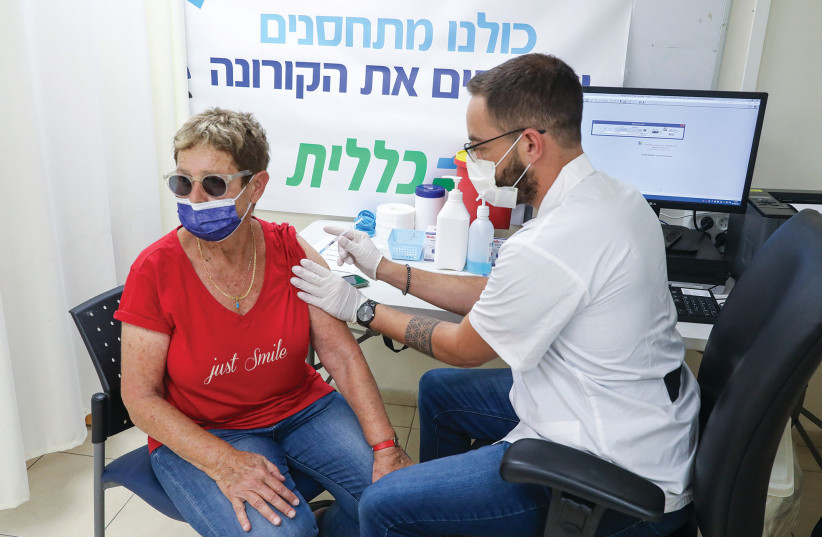An expert panel on Tuesday voted overwhelmingly to recommend the US Food and Drug Administration authorizes the Pfizer COVID-19 vaccine for children ages 5 to 11.
The decision was made after a several-hours long meeting on Tuesday afternoon. Seventeen members of the advisory committee voted in favor of the move, only one member abstained.
Briefing documents disseminated for the meeting showed that American experts believed the benefits of the vaccines likely outweigh the risks.
If the FDA authorizes the shot, the Centers for Disease Control will meet on November 2-3 to make its recommendations on how the shots should be administered. Israel is expected to follow suit and approve the shots a few weeks later.
Although the FDA does not always vote with its experts, the regulatory body usually does.
The Health Ministry has said it would independently review the data and hold its own series of discussions before it gives the green light.
The vaccines also would need to be ordered from Pfizer and delivered to Israel, since they are designed especially for children.
In Israel, there are 1,237,792 children between the ages of five and 11, including 213,047 who have recovered from the virus, according to Health Ministry data. This would mean that about one million five- to 11-year-olds would be eligible to get the jab.
Some 10 children have died of COVID-19 in Israel.
In the US, 94 children in this age group have died, N12 reported.
The FDA’s discussion reopened the debate over childhood vaccination in Israel among both parents and experts.
Nearly 50% of Israeli parents said they would vaccinate their five- to 11-year-olds if the FDA approves the vaccine, according to a survey published by Meuhedet Health Services on Monday. The survey included 680 parents of children in that age range.
Specifically, the survey showed that 48% of parents were sure or think they would give their children the jab, 23% definitely would not vaccinate their children, and 29% were undecided.
“Right now, when morbidity is not high, it is important to get children vaccinated as early as possible to prevent or reduce the next wave,” Meuhedet chief nursing officer Mali Kusha said.
During the summer, when the Health Ministry approved vaccines for 12- to 15-year-olds, it delayed strongly recommending the shot because infection was low in the country. About a month later, school outbreaks started the fourth wave.
Among those who said they would not vaccinate their children, 37% said it was due to concerns that the vaccine could have negative health consequences in the long run.
Some 18% said there was insufficient evidence regarding the effectiveness and safety of the vaccine.
Another 11% said they simply did not want their child vaccinated, while 7% said they assumed their child would catch the virus and then have natural protection.
MORE THAN a third of parents said they would consult with their pediatrician about vaccination, and another 23% said they were waiting to read articles on the subject, Kusha said.
“We have no doubt that extensive information is required here, both in the media and through pediatricians who have direct and continuous contact with families,” she said.
In an interview with The Jerusalem Post earlier this week, Israel Pediatric Society head Prof. Zachi Grossman said he expects his society to support vaccination because although children are less likely to develop serious disease, there are those who can. In this recent wave, many children were hospitalized, including some who were connected to life-saving, heart-lung ECMO machines.

Moreover, there have been increasing reports of children – even those who had asymptomatic cases of the virus – developing long-COVID or even pediatric inflammatory multisystem syndrome.
Other health experts have said Israel should be more cautious in rolling out the vaccine to children because long-term side effects of the vaccine are still unknown. The Pfizer trial included fewer than 2,000 children, meaning that any short-term side effects that occur in larger pools of vaccine recipients would not have been found.
The biggest concern is myocarditis, or inflammation of the heart, which has been found to be more common among younger vaccinated individuals. However, studies have also shown that the chance of developing heart inflammation is likely greater from the coronavirus than from the vaccine.
After complaints by the media and the public that previous discussions by the Advisory Committee for the Coronavirus Vaccines and Epidemic Control have been closed, the ministry said it would air live at least some of the discussion about children’s vaccines.
“The Special Committee for the Rights of the Child, headed by me, held its first transparent public debate on child vaccines two weeks ago,” MK Michal Shir (New Hope) said in a Facebook video. “The Health Ministry reports that only one in 3,000 children will develop severe coronavirus. Given this data... an open and transparent discussion should be allowed.”
The decision to vaccinate children comes as the number of new cases continues to decline. On Monday, 866 new cases of the virus were diagnosed, the Health Ministry reported Tuesday. There were 249 patients in serious condition Tuesday evening, including 156 who were intubated, it said.
Israel rapidly approved administering booster shots to the entire population over the age of 12, even before any recommendations were made by the FDA. However, the process will now take more time, Public Health Services head Dr. Sharon Alroy-Preis told N12 on Tuesday night.
Moreover, the ministry would not likely begin by sanctioning those who choose not to vaccinate their children, she said.
“Each parent needs to choose what’s right for them,” Alroy-Preis said, adding that vaccinating children could bring Israel to herd immunity and help end the pandemic.
